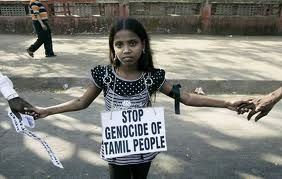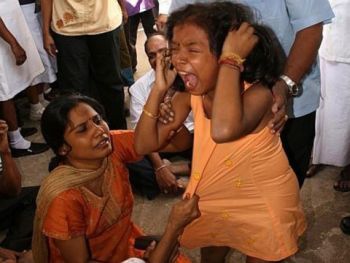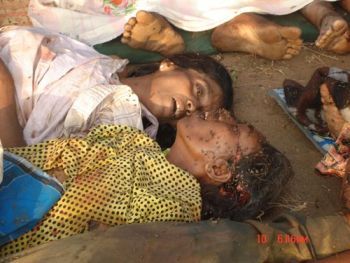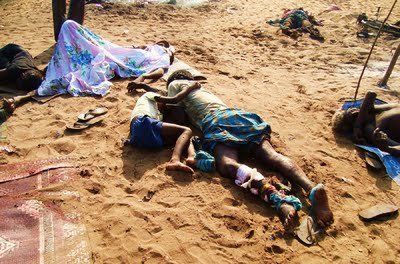
Publisher:
Bonnie King
CONTACT:
Newsroom@Salem-news.com
Advertising:
Adsales@Salem-news.com

~Truth~
~Justice~
~Peace~
TJP
Mar-21-2013 14:39

 TweetFollow @OregonNews
TweetFollow @OregonNews
Human Rights Council Resolution on Sri Lanka Crimes
Ron Ridenour Salem-News.comMore of the same nonsense causes huge protests.
 |
(GENEVA) - United Nation’s Human Rights Council’s passed a resolution on March 21, the third in four years, concerning Sri Lanka’s conduct towards Tamils. The vote was 25 for, 13 against with eight abstentions. Those opposed rejected any criticism of Sri Lanka as “foreign meddling”. (1)
The US-led resolution A/HRC/22/L.1 "Promoting Reconciliation and Accountability in Sri Lanka" “noted” that the National Action Plan put forward by Sri Lanka to implement the recommendations made in its own Lessons Learnt and Reconciliation Commission (LLRC) “does not adequately address serious violations of international humanitarian law.”
Sri Lanka’s government is then called upon to conduct an "independent and credible" investigation into allegations of human rights violations.
One paragraph goes a bit further than the previous US-led resolution last year. It expresses “concern at the continuing reports of violations of human rights in Sri Lanka, including enforced disappearances, extra-judicial killings, torture and violations of the rights of expression, association and peaceful assembly, as well as intimidation of and reprisals against human rights defenders, members of civil society and journalists, threats to judicial independence and the rule of law, and discrimination on the basis of religion and belief.” (2)
 |
While the US resolution also stated that Sri Lanka’s government (GoSL) has failed to devolve political authority to Tamils, it expressed thanks for having facilitated “the visit of a technical mission from the Office of the United Nations High Commissioner for Human Rights.” It “notes” the High Commissioner’s “call for an independent and credible international investigation into alleged violations of international human rights law and international humanitarian law,” without suggesting such itself. No remedies are demanded. The resolution simply concludes by suggesting further reports “monitoring progress”.
No more white-wash
A day before the vote, the greatest pro-Tamil protest in years took place with upwards of one million people in India’s state Tamil Nadu. They denounced the US-led resolution as “ineffectual” for calling upon the Sri Lanka government to investigate itself. Protestors demanded that the GoSL be investigated by an independent international body for its war crimes and genocide against the Tamil people.
Varieties of colorful actions, including civil disobedience, occurred in several Tamil Nadu cities and schools. People denounced the “empty resolution further diluted by New Delhi.” They called for a UN plebiscite for Tamils in the north of Sri Lanka. (3)
For the first time since the end of the civil war, significant numbers of Tamils have publicly protested the US for meaningless “slaps on the wrist”. Thousands of Tamils in many countries in the Diaspora demonstrated against the resolution, burning it before the US embassy in several cities. Protestors now view the US as actually “facilitating the agenda of the genocidal state”.
Critics assert that the US and Europe are not seriously advancing the rights of Tamils nor actually sanctioning GoSL for its brutal war crimes, and certainly not its 65 year-long genocide against the minority Tamils. They point out that the US, its side-kick Israel and NATO countries, always aided the Sri Lankan government.
The Western powers provided Sri Lanka’s military with weaponry, money, counter-intelligence, and training to win the long war against Tamil nationhood. Then, since their mutual victory, the Western axis criticizes the Asian government for having committed excesses. This “human rights” approach is the best of all possible worlds for Western dictates: world domination for the cause of humanity is what they say if you read between the lips of communicators for globalization. (4)
 |

China, Russia, Iran, India and Pakistan also militarily and economically assisted Sri Lankan governments in avoiding federalism for the two peoples—majority Sinhalese and minority Tamils—yet they did so without the hyperbole of “protecting human rights”. Unfortunately, Cuba and its seven associates in the Latin American-nation Bolivarian Alliance of the peoples of the Americas (ALBA) got caught up in the geo-political game and supported Sri Lanka.
The two ALBA countries on the Council, Ecuador and Venezuela, voted for Sri Lanka’s stance, while six other Latin American countries voted to criticize it. The Africa and Asian governments were divided in three ways. There was no obvious “first world,” “third world” juxtaposition. (1)
The conciliatory role India’s Congress party-led government plays to placate Sri Lanka with massive economic aid, and by diluting the original draft of the both 2012 and 2013 resolutions, led the Tamil Nadu DMK (Dravida Munnetra Kazhagan) party to withdraw its participation in the coalition UPA (United Progressive Alliance) government. By losing 18 seats in the government, including the minority party’s five ministers, Congress President Sonia Gandhi felt compelled to state that, “We are fully committed to the cause of Lankan Tamils and an impartial inquiry should happen into the allegations of atrocities against them.”
Apparently, at the last minute, the weakened UPA government leadership tried to amend the final draft with stronger words, according to the newspaper “The Hindu”.
However, DMK Chief Muthuvel Karunanidhi said, “There were no strong words of censure against Sri Lanka in that resolution, which indicated that there was no scope at all to incorporate amendments suggested by the DMK like including the word ‘genocide’.”
 |
Karunanidhi said, on March 19, this justified the decision to pull out of the government, which forces the Congress party to rely even more so on opposition parties, in order to continue to rule.
The new resolution has not ceded to demands of human rights bodies and almost all Tamil political parties and grass roots organizations for an independent international investigation, which UN High Commissioner for Human Rights Navaneetham Pillay also asserts is necessary.
She has consistently upheld the findings of the “Report of the Secretary-General’s Panel of Experts on Accountability in Sri Lanka” delivered to Secretary-General Ban Ki-moon on March 31, 2011.
“The Panel found credible allegations associated with the final stages of the war. Between September 2008 and 19 May 2009, the Sri Lanka Army advanced its military campaign into the Vanni using large-scale and widespread shelling causing large numbers of civilian deaths. This campaign constituted persecution of the population of the Vanni. Around 330,000 civilians were trapped into an ever decreasing area, fleeing the shelling but kept hostage by the LTTE [Liberation Tigers of Tamil Eelam]. The Government sought to intimidate and silence the media and other critics of the war through a variety of threats and actions, including the use of white vans to abduct and to make people disappear.
 |
“The Government shelled on a large scale in three consecutive No Fire Zones, where it had encouraged the civilian population to concentrate, even after indicating that it would cease the use of heavy weapons. It shelled the United Nations hub, food distribution lines and near the International Committee of the Red Cross (ICRC) ships that were coming to pick up the wounded and their relatives from the beaches. It shelled in spite of its knowledge of the impact, provided by its own intelligence systems and through notification by the United Nations, the ICRC and others. Most civilian casualties in the final phases of the war were caused by Government shelling.”
The new resolution is virtually the same as the one put forth by the US last March when the HRC made a shift from the pro-Sri Lanka resolution of May 2009. In March 2012, a majority (24 for, 15 against and 8 abstentions) voted to criticize the Sri Lankan government for “not adequately address[ing] serious allegations of violations of international law” when conducting its final phases of war against the liberation guerrilla army LTTE (Liberation Tigers for Tamil Eelam). Nevertheless, the statement simply asked the government to investigate itself. (5)

Despite the UN panel of experts’ 214-page report and recommendations, and those of the High Commissioner, no session of the Human Rights Council has discussed those recommendations.
While US-NATO conducts war crimes against several countries in the Middle East and Africa, progressive governments in Latin America, along with Russia-China-Iran-Pakistan, view the US role in Sri Lanka as hypocrisy. This motivates those governments to back Sri Lanka as a “victim” of US-European meddling. In so doing, they are silent about the crimes against the Tamil people.
Venezuela, a new member on the HRC replacing Cuba, voted against the slap wrist resolution. Parting from journalistic style, I would suggest that Venezuela, in the spirit of its recently deceased leader, Hugo Chávez, would take the bull by the horns. Take the moral, solidarity path and admit war crimes wherever they are committed and oppose them. That goes for Sri Lanka, and it goes more so for the US-UK-NATO axis. Publicly chastise Sri Lanka for its brutality, and then introduce a new HRC resolution indicting the Western axis for the untold amount of human blood and planet destruction it causes with its aggressive profit-grabbing wars.
 |
Future Actions

There is a shift in the wind. Tamils are righteously upset with the US-UK axis. The multitude of Tamil groups especially some international ones in the Diaspora, have relied upon the axis to come to their aid. After four years of getting nowhere, great numbers of Tamils are awakened.
Some pro-Tamils groups are calling upon the Commonwealth Ministerial Action Group (CMAG) to prevent Sri Lanka being rewarded as planned by hosting the Commonwealth’s grand summit this November.
The moderate Sri Lanka Campaign for Peace and Justice wrote: “If the Commonwealth continues as usual then the Government of Sri Lanka will be able to use this to whitewash their crimes, and derail the process of reconciliation. The cycle of violence will continue.”
The group initiated a petition to sign pressuring Commonwealth countries to follow “the Canadian Prime Minister's example and announcing that if the summit happens then they will not go.” (6)
The group initiated a petition to sign pressuring Commonwealth countries to follow “the Canadian Prime Minister's example and announcing that if the summit happens then they will not go.” (6)
A more activist movement is expected to grow now!
Notes:
(1) The Vote:
YES: Argentina, Austria, Benin, Brazil, Chile, Costa Rica, Cöte d’Ivoire, Czech Republic, Estonia, Germany, Guatemala, India, Ireland, Italy, Libya, Montenegro, Peru, Poland, Republic of North Korea, Republic of Moldova, Romania, Sierra Lone, Spain, Switzerland, USA
NO: Congo, Ecuador, Indonesia, Kuwait, Maldives, Mauritania, Pakistan, Philippines, Qatar, Thailand, Uganda, United Arab Emirates, Venezuela
ABSTAIN: Angola, Botswana, Burkina Faso, Ethiopia, Japan, Kazakhstan, Kenya, Malaysia
NO VOTE: Gabon
(3) http://www.tamilnet.com/art.
(4) http://www.ronridenour.com/
(5) See: http://www.ronridenour.com/
http://www.ronridenour.com/
(6) ) http://www.change.org/
March 21, 2013
 Ron Ridenour was born in the devil's own country, he rejected the American Dream and became a solidarity and revolutionary activist and writer nearly half-a-century ago. Ridenour has worked as a journalist-editor-author-translator for three decades. He worked for Cuba's Editorial José Martí and Prensa Latina for eight years, and has published five books about Cuba, as well as Yankee Sandinistas. Born to a WASP military career father, Ron sought the “American Dream” until he entered the Air Force, in 1956, to fight the “commies”.
Ron Ridenour was born in the devil's own country, he rejected the American Dream and became a solidarity and revolutionary activist and writer nearly half-a-century ago. Ridenour has worked as a journalist-editor-author-translator for three decades. He worked for Cuba's Editorial José Martí and Prensa Latina for eight years, and has published five books about Cuba, as well as Yankee Sandinistas. Born to a WASP military career father, Ron sought the “American Dream” until he entered the Air Force, in 1956, to fight the “commies”.
Here, Ronald witnessed approved segregated barracks on a U.S. military in Japan, and imposition of racism in Japanese establishments. This, and the fact that his group had orders to shoot down any Soviet aircraft over “their” territory in Japan—which never appeared—while the U.S. flew spy planes over the Soviet Union daily, led this writer to question American “morality”. The first time Ronald exercised his democratic right to demonstrate was in Los Angeles, where he protested with others the Yankee invasion of Cuba, at the Bay of Pigs. Cuba’s revolution, and his hate for racism, which led Ronald to become a radical, then a revolutionary.
 |
 |
Articles for March 20, 2013 | Articles for March 21, 2013 | Articles for March 22, 2013
Salem-News.com:





Terms of Service | Privacy Policy
All comments and messages are approved by people and self promotional links or unacceptable comments are denied.
[Return to Top]
©2025 Salem-News.com. All opinions expressed in this article are those of the author and do not necessarily reflect those of Salem-News.com.